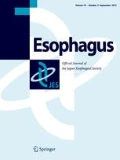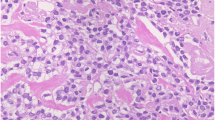Abstract
Neoadjuvant chemotherapy (NAC) followed by surgery is the standard treatment for esophageal squamous cell carcinoma diagnosed as clinical stage II/III in Japan, and the indications for chemotherapy for esophageal cancer are increasing. Here, we report two patients who suffered from upper gastrointestinal perforation during NAC for esophageal cancer. NAC with cisplatin and 5-fluorouracil (CF regimen) was performed for both patients. Emergency operations were performed in all the patients prior to curative surgery for esophageal cancer. Endoscopic examination should be performed to confirm peptic ulcers or scars before NAC with CF regimen, and premedication with a proton pump inhibitor and the avoidance of steroid use are recommended for patients with a history of peptic ulcer to prevent perforation during NAC. Whether the occurrence of perforations during NAC is a risk factor for recurrence or a poor prognosis should be investigated in patients with esophageal cancer.


Similar content being viewed by others
References
Ando N, Kato H, Igaki H, Shinoda M, Ozawa S, Shimizu H, et al. A randomized trial comparing postoperative adjuvant chemotherapy with cisplatin and 5-fluorouracil versus preoperative chemotherapy for localized advanced squamous cell carcinoma of the thoracic esophagus (JCOG9907). Ann Surg Oncol. 2012;19:68–74.
Ando N, Iizuka T, Ide H, Ishida K, Shinoda M, Nishimaki T, et al. Surgery plus chemotherapy compared with surgery alone for localized squamous cell carcinoma of the thoracic esophagus: a Japan Clinical Oncology Group—JCOG9204. J Clin Oncol. 2003;21:4592–6.
Badgwell BD, Camp ER, Feig B, Wolff RA, Eng C, Ellis LM, et al. Management of bevacizumab-associated bowel perforation: a case series and review of the literature. Ann Oncol. 2008;19:577–82.
Sfakianos GP, Numnum TM, Halverson CB, Panjeti D, Kendrick JE 4th, Straughn JM Jr. The risk of gastrointestinal perforation and/or fistula in patients with recurrent ovarian cancer receiving bevacizumab compared to standard chemotherapy: a retrospective cohort study. Gynecol Oncol. 2009;114:424–6.
Puthillath A, Mashtare T, Wilding G, Khushalani N, Steinbrenner L, Ross ME, et al. A phase II study of first-line biweekly capecitabine and bevacizumab in elderly patients with metastatic colorectal cancer. Oncol Hematol. 2009;71:242–8.
Poirier E, Desbiens C, Poirier B, Hogue JC, Lemieux J, Doyle C, et al. Comparison of serious adverse events between the original and a generic docetaxel in breast cancer patients. Ann Pharmacother. 2014;48:447–55.
Daniels JA, Gibson MK, Xu L, Sun S, Canto MI, Health E, et al. Gastrointestinal tract epithelial changes associated with taxanes: marker of drug toxicity versus effect. Am J Surg Pathol. 2008;32:473–7.
Hruban RH, Yardley JH, Donehower RC, Boitnott JK, et al. Taxol toxicity. Epithelial necrosis in the gastrointestinal tract associated with polymerized microtubule accumulation and mitotic arrest. Cancer. 1989;63:1944–50.
Liaw CC, Huang JS, Wang HM, Wang CH. Spontaneous gastroduodenal perforation in patients with cancer receiving chemotherapy and steroids. Cancer. 1993;72:1382–5.
Gomez D, Morris-Stiff G, Wyatt J, Toogood GJ, Lodge JP, Prasad KR. Surgical technique and systemic inflammation influences long-term disease-free survival following hepatic resection for colorectal metastasis. J Surg Oncol. 2008;98:371–6.
Author information
Authors and Affiliations
Corresponding author
Ethics declarations
Ethical Statement
All procedures followed were in accordance with the ethical standards of the responsible committee on human experimentation (institutional and national) and with the Helsinki Declaration of 1964 and later versions. Informed consent or substitute for it was obtained from all patients for being included in the study.
Conflict of interest
The authors have no conflicts of interest to disclose.
Rights and permissions
About this article
Cite this article
Oguma, J., Ozawa, S., Kazuno, A. et al. Gastrointestinal perforation during neoadjuvant chemotherapy with cisplatin and 5-fluorouracil in patients with esophageal cancer: a report of two cases. Esophagus 13, 374–377 (2016). https://doi.org/10.1007/s10388-016-0537-5
Received:
Accepted:
Published:
Issue Date:
DOI: https://doi.org/10.1007/s10388-016-0537-5




